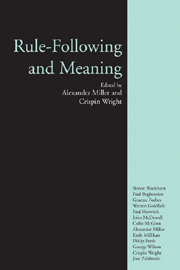Book contents
- Frontmatter
- Contents
- Acknowledgements
- The Contributors
- 1 Introduction
- 2 Skepticism and Semantic Knowledge
- 3 The Individual Strikes Back
- 4 Wittgenstein on Following a Rule
- 5 Wittgenstein, Kripke and Non-Reductionism about Meaning
- 6 Kripke on Wittgenstein on Rules
- 7 Critical Notice of Colin McGinn's Wittgenstein on Meaning
- 8 Meaning and Intention as Judgement Dependent
- 9 The Rule-Following Considerations
- 10 The Reality of Rule-Following
- 11 Truth Rules, Hoverflies, and the Kripke–Wittgenstein Paradox
- 12 Kripke on Wittgenstein on Normativity
- 13 Meaning, Use and Truth
- 14 Kripke's Normativity Argument
- Guide to Further Reading
- Index
4 - Wittgenstein on Following a Rule
- Frontmatter
- Contents
- Acknowledgements
- The Contributors
- 1 Introduction
- 2 Skepticism and Semantic Knowledge
- 3 The Individual Strikes Back
- 4 Wittgenstein on Following a Rule
- 5 Wittgenstein, Kripke and Non-Reductionism about Meaning
- 6 Kripke on Wittgenstein on Rules
- 7 Critical Notice of Colin McGinn's Wittgenstein on Meaning
- 8 Meaning and Intention as Judgement Dependent
- 9 The Rule-Following Considerations
- 10 The Reality of Rule-Following
- 11 Truth Rules, Hoverflies, and the Kripke–Wittgenstein Paradox
- 12 Kripke on Wittgenstein on Normativity
- 13 Meaning, Use and Truth
- 14 Kripke's Normativity Argument
- Guide to Further Reading
- Index
Summary
These things are finer spun than crude hands have any inkling of.
(RFM VII-57)We find it natural to think of meaning and understanding in, as it were, contractual terms. Our idea is that to learn the meaning of a word is to acquire an understanding that obliges us subsequently – if we have occasion to deploy the concept in question – to judge and speak in certain determinate ways, on pain of failure to obey the dictates of the meaning we have grasped; that we are “committed to certain patterns of linguistic usage by the meanings we attach to expressions”. According to Crispin Wright, the burden of Wittgenstein's reflections on following a rule, in his later work, is that these natural ideas lack the substance we are inclined to credit them with: “there is in our understanding of a concept no rigid, advance determination of what is to count as its correct application”.
If Wittgenstein's conclusion, as Wright interprets it, is allowed to stand, the most striking casualty is a familiar intuitive notion of objectivity. The idea at risk is the idea of things being thus and so anyway, whether or not we choose to investigate the matter in question, and whatever the outcome of any such investigation. That idea requires the conception of how things could correctly be said to be anyway – whatever, if anything, we in fact go on to say about the matter; and this notion of correctness can only be the notion of how the pattern of application that we grasp, when we come to understand the concept in question, extends, independently of the actual outcome of any investigation, to the relevant case.
- Type
- Chapter
- Information
- Rule-Following and Meaning , pp. 45 - 80Publisher: Acumen PublishingPrint publication year: 2002
- 1
- Cited by



